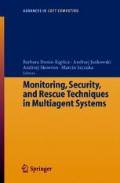Summary
It cannot always be assumed that agents will behave as they are supposed to behave. Agents may fail to comply with system norms deliberately, in open agent systems or other competitive settings, or unintentionally, in unreliable environments because of factors beyond their control. In addition to analysing system properties that hold if specifications/norms are followed correctly, it is also necessary to predict, test, and verify the properties that hold if system norms are violated, and to test the effectiveness of introducing proposed control, enforcement, and recovery mechanisms. C+++ is an extended form of the action language C+ of Giunchiglia, Lee, Lifschitz, McCain, and Turner, designed for representing norms of behaviour and institutional aspects of (human or computer) societies. We present the permission component of C+++ and then illustrate on a simple example how it can be used in conjunction with standard model checkers for the temporal logic CTL to verify system properties in the case where agents may fail to comply with system norms.
Access this chapter
Tax calculation will be finalised at checkout
Purchases are for personal use only
Preview
Unable to display preview. Download preview PDF.
References
Subrahmanian, V.S., Bonatti, P., Dix, J., Eiter, T., Kraus, S., Ozcan, F., Ross, R.: Heterogeneous Agent Systems. MIT Press, Cambridge (2000)
Rissanen, E., Sadighi Firozabadi, B., Sergot, M.J.: Towards a mechanism for discretionary overriding of access control (position paper). In: Proc. 12th International Workshop on Security Protocols, Cambridge, April 2004. (2004)
Artikis, A., Pitt, J., Sergot, M.J.: Animated specification of computational societies. In Castelfranchi, C, Johnson, W.L., eds.: Proc. 1st International Joint Conference on Autonomous Agents and Multi-Agent Systems (AAMAS’02), Bologna, ACM Press (2002) 1053–1062
Artikis, A., Sergot, M.J., Pitt, J.: Specifying electronic societies with the Causal Calculator. In Giunchiglia, F., Odell, J., Weiss, G., eds.: Agent-Oriented Software Engineering III. Proc. 3rd International Workshop (AOSE 2002), Bologna, July 2002. LNCS 2585, Springer (2003) 1–15
Artikis, A., Sergot, M.J., Pitt, J.: An executable specification of an argumentation protocol. In: Proc. 9th International Conference on Artificial Intelligence and Law (ICAIL’03), Edinburgh, ACM Press (2003) 1–11
Lomuscio, A., Sergot, M.J.: Deontic interpreted systems. Studia Logica 75 (2003) 63–92
Lomuscio, A., Sergot, M.J.: A formalisation of violation, error recovery, and enforcement in the bit transmission problem. Journal of Applied Logic 2 (2004) 93–116
Fagin, R., Halpern, J.Y., Moses, Y., Vardi, M.Y.: Reasoning about Knowledge. MIT Press, Cambridge (1995)
Sergot, M.: The language C+++. In Pitt, J., ed.: The Open Agent Society. Wiley (2004) (In press). Extended version: Technical Report 2004/8. Department of Computing, Imperial College, London.
Giunchiglia, E., Lee, J., Lifschitz, V., McCain, N., Turner, H.: Nonmonotonic causal theories. Artificial Intelligence 153 (2004) 49–104
Giunchiglia, E., Lifschitz, V.: An action language based on causal explanation: Preliminary report. In: Proc. AAAI-98, AAAI Press (1998) 623–630
van der Hoek, W, Roberts, M., Wooldridge, M.: Social laws in alternating time: Effectiveness, feasibility, and synthesis. Technical report, Dept. of Computer Science, University of Liverpool (2004) Submitted.
Jamroga, W, van der Hoek, W, Wooldridge, M.: On obligations and abilities. In Lomuscio, A., Nute, D., eds.: Proc. 7th International Workshop on Deontic Logic in Computer Science (DEON’04), Madeira, May 2004. LNAI 3065, Springer (2004) 165–181
Meyer, J-J.: A different approach to deontic logic: Deontic logic viewed as a variant of dynamic logic. Notre Dame Journal of Formal Logic 29 (1988) 109–136
Fioravanti, F., Pettorossi, A., Proietti, M.: Verifying CTL properties of infinite state systems by specializing constraint logic programs. In: Proceedings of Second ACM-Sigplan International Workshop on Verification and Computational Logic (VCL’01), Florence, September 2001. (2001) 85–96 Expanded version: Technical Report R. 544, IASI-CNR, Rome.
Author information
Authors and Affiliations
Rights and permissions
Copyright information
© 2005 Springer-Verlag Berlin Heidelberg
About this paper
Cite this paper
Sergot, M. (2005). Modelling Unreliable and Untrustworthy Agent Behaviour. In: Monitoring, Security, and Rescue Techniques in Multiagent Systems. Advances in Soft Computing, vol 28. Springer, Berlin, Heidelberg. https://doi.org/10.1007/3-540-32370-8_11
Download citation
DOI: https://doi.org/10.1007/3-540-32370-8_11
Publisher Name: Springer, Berlin, Heidelberg
Print ISBN: 978-3-540-23245-2
Online ISBN: 978-3-540-32370-9
eBook Packages: EngineeringEngineering (R0)

